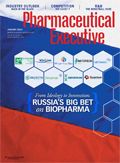For Russia—Tough Love
Pharmaceutical Executive
Pharm Exec begins its 34th year with a feature on Russia's ambitious plans to build a homegrown biopharma business. Back in 1980, the biotech industry did not exst. Drugs were still classified as chemicals, developed from the random screening of many thoughts.
PHARM EXEC BEGINS ITS 34TH YEAR with a cover feature on Russia's ambitious plans to build a homegrown biopharma business. Back in 1980, the biotech industry did not exist. Drugs were still classified as chemicals, developed from the random screening of many thousands of small molecules. Finished medicines were produced in bulk quantities for an undifferentiated patient base; individualized efficacy was difficult to prove. More important, there was little difference between the means of production in Western markets and the socialist planned economies embodied by Russia – medicines, still a low-tech purchase, played a modest role in the delivery of health care in both sectors.
What happened in the ensuing decades has clearly produced a different result, leaving the Russian industry far behind its U.S. and European counterparts in the two key indicators of the quality of medicines and the state of public health. The Russian industry remains mired in an imitative model that has failed to generate a single "world class" medicine that can be sold outside its own borders, while statistical measures of mortality and morbidity have soared in the context of a demographic crisis that has the UN projecting the country's population will fall to 110 million by 2050 – a loss of some 35 million people compared to today.

William Looney
A big part of the solution depends on increased access to the life-saving drugs developed in the US and Europe over the past 30 years, including treatments for hypertension, stroke, cardiovascular disease, HIV, and diabetes, all of which are at near epidemic levels in Russia today – and precisely where more local investment in R&D is needed to make an impact.
Russia's lag confers a lesson about the fecundity of science when it encounters three things: an open environment for learning, characterized by the easy transfer of knowledge and other forms of human capital; ready access to financing; and a predictable, transparent regulatory structure, founded on rule of law. Government involvement in funding the unallocated costs of basic research is important too. And there is a hidden element behind successful science that big Pharma tends to take for granted, but which accounts for many of the setbacks companies are encountering not just in Russia but in all emerging countries: a functioning, system of health financing that guarantees most patients will be able to afford the care they need. Without this infrastructure, selling any kind of health care product is an opportunistic game of chance rather than a viable, permanent business.
Interviews for our cover feature indicates a dire need for Russia to make progress in each of these areas if it wants to transition to a knowledge-based economy, where life sciences seed the partnerships that lead to a more global market orientation less reliant on commodity exports.
The challenges are straightforward. First, there is a continuing local talent gap, where the best scientists leave for the West at the peak of their learning curve, leaving behind a fading generation of Soviet-era scientists and an untested surfeit of new graduates. Second, money to fund biotech start-ups is virtually impossible to obtain outside of government, which makes entrepreneurship hostage to the ebb and flow of the budgetary cycle, which is itself driven by conflicting – and largely political – pressures. Third, power to regulate the industry is paradoxically centralized and fragmented at the same time, leading to inconsistencies between strategy and execution that investors are often left to sort out on their own. Finally, though Russia has been talking about expanding its fragile safety net for basic medical care, the loss of hydrocarbon revenues makes it unlikely there will be a significant government commitment to medicines access anytime soon. For at least the next year or two, an economically pinched middle-class will face a drop in the discretionary income it might normally spend on health care.
The one bright spot is the steady acceleration of collaborative networks between big Pharma and Russian investors and producers. If there are any remaining doubts about globalization as a preferred business behavior in biopharma, look no further than Russia. It's a slow process, but over time these networks will reinforce positive behaviors at both ends of the business: foreign MNCs will no longer be saddled with a reputation as money-hungry interlopers, while "brand Russia" moves a bit closer to earning a coveted spot on the global league tables of innovation.
By the way, is anyone in Germany – pharma's latest poster child for bad behavior – listening?

William Looney Editor-in-Chief wlooney@advanstar.com, Follow Bill on Twitter: @BillPharmExec
Addressing Disparities in Psoriasis Trials: Takeda's Strategies for Inclusivity in Clinical Research
April 14th 2025LaShell Robinson, Head of Global Feasibility and Trial Equity at Takeda, speaks about the company's strategies to engage patients in underrepresented populations in its phase III psoriasis trials.
Amgen’s Imdelltra Demonstrates Significant Overall Survival Improvement in Small Cell Lung Cancer
April 16th 2025In the Phase III DeLLphi-304 trial, patients with small cell lung cancer administered Imdelltra achieved a statistically significant and clinically meaningful improvement in overall survival compared to standard-of-care chemotherapy.
Beyond the Prescription: Pharma's Role in Digital Health Conversations
April 1st 2025Join us for an insightful conversation with Jennifer Harakal, Head of Regulatory Affairs at Canopy Life Sciences, as we unpack the evolving intersection of social media and healthcare decisions. Discover how pharmaceutical companies can navigate regulatory challenges while meaningfully engaging with consumers in digital spaces. Jennifer shares expert strategies for responsible marketing, working with influencers, and creating educational content that bridges the gap between patients and healthcare providers. A must-listen for pharma marketers looking to build trust and compliance in today's social media landscape.
